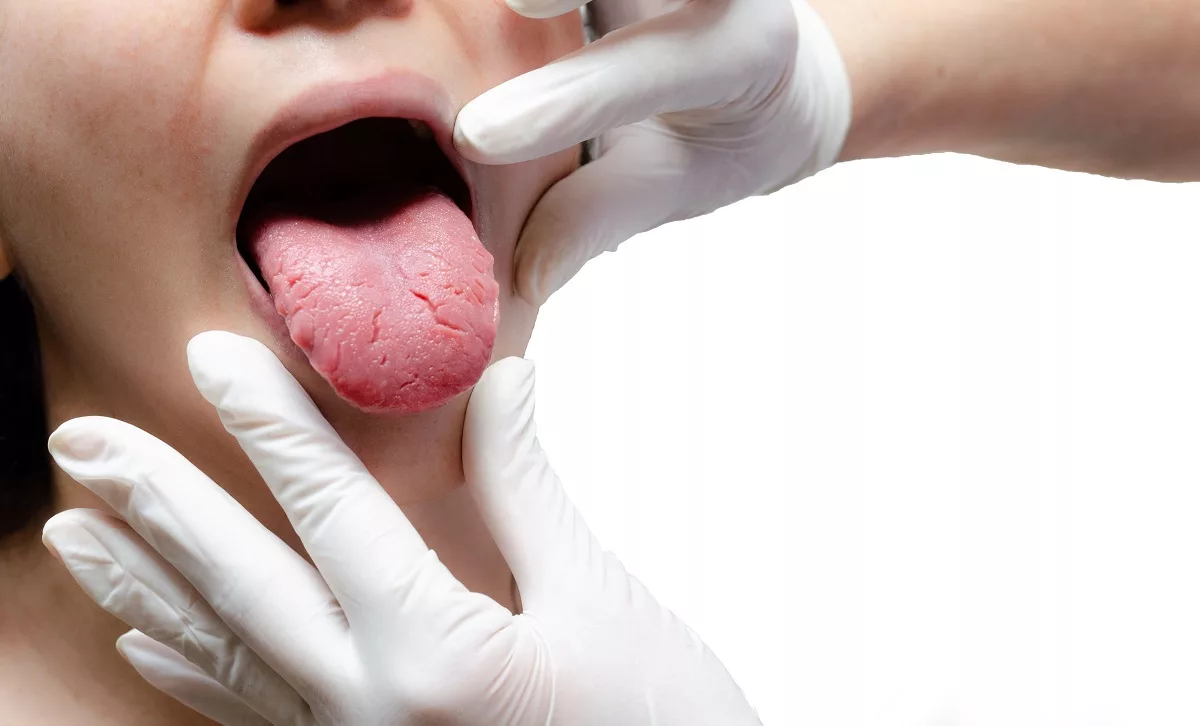Sometimes, people may develop tongue problems. These include a tongue that is painful, enlarged, swollen, or has an unusual color, such as white, yellow, brown, or black. While there are some congenital (present at birth) conditions (including inflammation, infections, and other conditions) that may cause problems with this muscle, problems with the tongue may sometimes indicate health problems. In most cases, these problems are easily diagnosed and treated.
A powerful muscle that helps chew and swallow food is called the tongue. It also helps to speak. Usually, tongue problems are not serious, but some changes may be a symptom of a more serious disease. If you notice any changes in the structure or color of the tongue without a reason, do not hesitate to see a doctor.
Symptoms
Check below for the most common symptoms that may affect the tongue:
- Enlarged and swollen tongue
- Difficulty moving the tongue
- Partial or complete loss of taste
- Changes in the tongue color (including dark red, purple, yellow, white, brown, or black) or structure (smooth or covered in raised patches or hair-like growths)
- Burning sensation throughout the tongue
- Soreness
- Pain
Contact your healthcare professional if any of the previous symptoms occur.
Causes
While some people develop short-term tongue problems, others may experience problems for long periods. Moreover, these problems range in severity from simple first-degree burns (such as from eating hot foods) to more serious diseases (including cancer).
Enlarged or Swollen Tongue
There is a condition in which the tongue becomes atypically large, and it is called macroglossia. In most cases, an enlarged or swollen tongue is caused by an underlying congenital or acquired condition. Check below for other conditions that may cause an enlarged tongue:
- Acromegaly – This is a rare health condition in which the body produces too much growth hormone. Thus, it may cause an enlarged tongue.
- Amyloidosis – This is a protein condition that prevents tissues and organs from working properly. As a result, the tongue may be enlarged or swollen, which usually looks rippled on the edges.
- Beckwith-Wiedemann syndrome – This is a condition that negatively affects the child’s development. It may also cause the tongue to appear bigger than usual for their age.
- Down syndrome – A congenital (present at birth) disorder in which the mental and physical development is affected. As a result, the tongue may become swollen or enlarged.
- Hunter syndrome (mucopolysaccharidosis) – This medical term refers to a group of conditions that impact the child’s development. Furthermore, an enlarged tongue is a common symptom of these disorders.
- Hypothyroidism – When this condition occurs, the body does not release enough thyroid hormone into the bloodstream. Thus, it may lead to macroglossia, especially in children.
- Tumors – There are some benign (noncancerous) tumors (including lymphangiomas and hemangiomas) and malignant (cancerous) tumors (such as lymphoma) that may cause an enlarged tongue.
However, there is another condition (glossitis) that causes inflammation that may lead to a swollen tongue. Check below some causes of glossitis:
- Infections
- Mouth injuries
- Hormonal imbalance
- Nutritional deficiency (also known as malnutrition)
- Xerostomia (dry mouth)
- Irritation caused by spicy food or tobacco
- Allergic reactions to medications or food
Difficulty Moving the Tongue
Some people may have problems with moving the tongue. It may happen due to nerve damage that affects the tissue that limits movement. Check below some causes:
- Dysarthria – This condition causes nerve damage that may lead to paralyzed or weakened speaking muscles, including the tongue.
- Glossoptosis – This is a condition present at birth that causes the tongue to be set too far back in the mouth. Usually, people with glossoptosis also have cerebral palsy, Down syndrome, or Pierre Robin syndrome.
- Ankiloglossia (tongue-tie) – In people who develop this condition, the tongue is attached to the floor of the mouth, which often causes difficulty moving the tongue.
Taste Changes
There are some factors and conditions that may cause partial or complete loss of taste (ageusia). Check below some potential causes:
- Fungal, bacterial, or viral infections
- Adverse reactions to some medicines (including chemotherapy)
- Nerve damage
- Injuries to the taste buds
Tongue Texture and Color Changes
In most cases, tongue color changes are a sign of poor hygiene, but sometimes, they may indicate an infection or other health conditions. Check below some examples:
- White tongue – Usually, if you have a white tongue, it indicates a bacterial buildup. In rare cases, this is a symptom of oral thrush, oral lichen planus, or a serious health condition (leukoplakia) that may progress to cancer.
- Yellow tongue – This may occur due to dead skin cells on the surface of the tongue.
- Black hairy tongue – In such cases, dead skin cells are trapped on the surface of the tongue and cause it to look brown or black. Rarely, it may indicate misuse of alcoholic drinks, smoking, or dry mouth. Some people may develop tongue color changes due to radiation therapy to the head or neck.
- Geographic tongue – This is not a contagious condition, but it may sometimes cause pain and tongue color changes.
If you notice your tongue color becomes red, it may indicate the following health conditions. For example:
- Vitamin B-12 and folic acid deficiency – It may cause the tongue to feel swollen and sore.
- Kawasaki disease – The tongue may appear cracked in people with this disorder. Sometimes, it may look red and bumpy (similarly to a strawberry).
- Pellagra – In people with this condition, the tongue may swell, and you may also develop mouth sores.
- Pernicious anemia – This condition may cause the tongue to become red and smooth.
- Scarlet fever – In most cases, strawberry tongue is a symptom of this disorder.
Tongue Pain
This type of tongue problem may also include soreness and burning. While in most cases, tongue pain happens due to inflammation or infections, it may also occur due to the following causes. Examples include:
- Injuries – In some cases, injuries may occur when consuming certain foods or drinks (including hot tea). As a result, you may experience a painful and burned tongue.
- Sores and mouth ulcers – For example, cancer sores, cold sores (also known as fever blisters), and mouth ulcers.
- Dental problems – Tongue pain may also occur due to poor oral hygiene. Furthermore, poorly fitted dentures may also lead to pain.
- Glossopharyngeal neuralgia – This is a rare condition that causes damage to the nerves that run through a part of the tongue. As a result, it may lead to stabbing pain in the back of the tongue.
- Burning mouth syndrome (also called burning tongue) – mostly, this condition is diagnosed in postmenopausal women and people over 60 years old. It causes the roof of the mouth and tongue to feel as if they are burning.
In addition, you may also experience tongue pain due to other health conditions, including anemia, geographic tongue, and glossitis.
How to Prevent Tongue Problems?
Unfortunately, not every time is possible to prevent conditions that cause tongue problems. However, you can take steps to reduce the risk. For example:
- Practice good oral hygiene (including brushing and flossing teeth twice daily)
- Scrape the tongue to remove bacteria
- Get regular dental cleanings
- Quit smoking (if you face problems with smoking cessation, discuss it with your healthcare professional)
Diagnosis
Physicians usually notice tongue problems during a physical examination. They may also ask some questions about your medical history and symptoms. In some cases, doctors may perform some tests to confirm a condition or rule out others that cause similar symptoms. Check below some examples:
- Blood tests – These tests help confirm anemia or a nutritional deficiency.
- Biopsy – During this procedure, doctors will take a small sample of the affected tissue for testing under a microscope to check for precancerous or cancerous cells.
Treatment
The treatment is often different among people with tongue problems because it depends on several factors. The underlying condition, the symptoms you experience, your overall health, age, and preferences.
- First-aid – For example, medical care for a burned tongue.
- Speech therapy – This treatment may be recommended by doctors when symptoms negatively affect the ability to speak.
- Medications – This option is often recommended to treat an underlying condition, such as a bacterial or fungal infection.
Frequently Asked Questions
When should I worry about my tongue?
It is recommended to schedule a visit to a physician if you experience severe symptoms that do not go away for more than 14 days.
What does a diseased tongue look like?
It often looks uniformly pink and may be covered with small bumps. You may also notice tongue color changes (including white, dark red, purple, brown, or black). Do not hesitate to see a doctor if any of these changes occur.
Can your tongue indicate health problems?
Yes, if you have an enlarged or swollen tongue, it may indicate an allergic reaction, a tumor, a nutritional deficiency, or another health condition. In such cases, you should see a doctor for a diagnosis. It is not recommended to take any medicine without a doctor’s approval because it may worsen the symptoms or not work. If you have additional questions, ask your healthcare professional.




